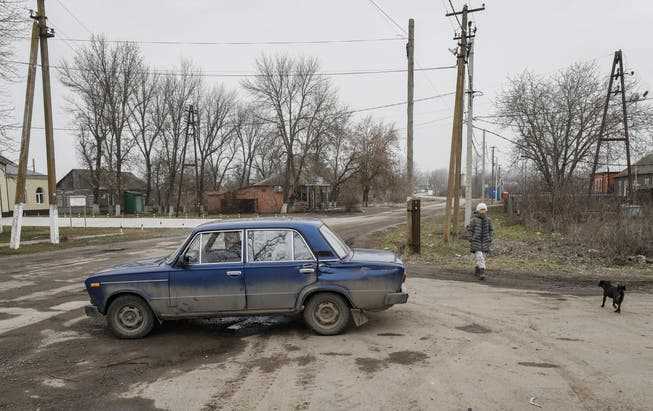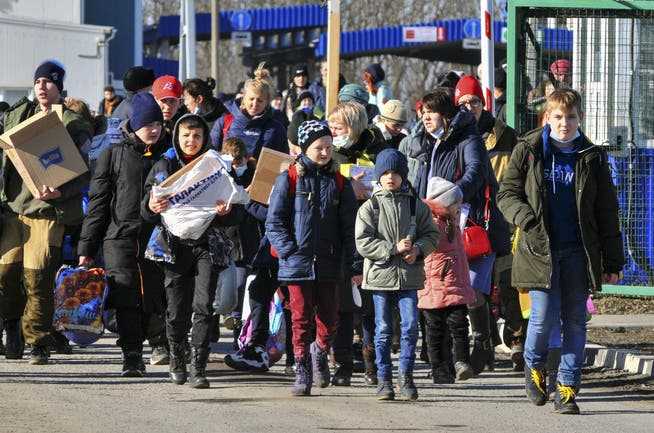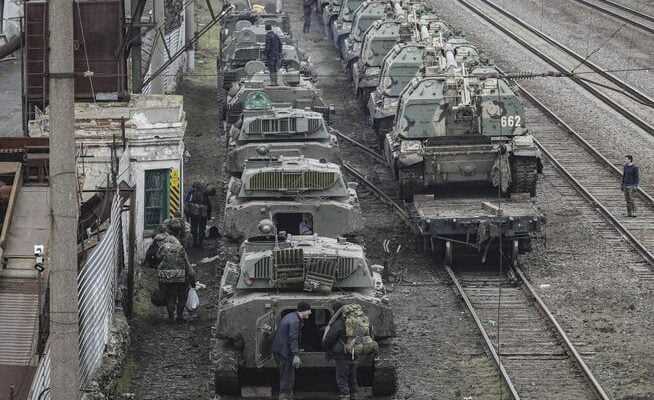Until recently, hardly anyone in Russia believed in a war with Ukraine. Even now, many Russians do not seem to feel affected. Some are worried about their own well-being in the face of the economic situation.
Russian military vehicles loaded on board are seen at the Rostov-on-Don railway station on February 23.
In Rostov-on-Don, the “capital” of southern Russia around 100 kilometers from the Ukrainian border, it is cloudy, rainy and colder than on the previous days. The city is still lively, albeit a little less than in the first half of the week. This has nothing to do with Russia’s attack on Ukraine in the early hours of the morning. What happened that night and what is currently happening is only slowly seeping into people’s minds.
“Yes, a friend told me about it,” says the woman at the hotel reception. She does not yet know that all twelve airports near the border with Ukraine, including those in Rostov, Sochi, Krasnodar and Stavropol in the immediate vicinity, will be closed until March 2nd. “I was hoping that they would come to their senses,” she says, shaking her head. It is not entirely clear who “they” are: the Russian leadership? The Ukrainians? The West?
Concern about the standard of living
Nikolai is not intimidated by the wet and cold weather: he is used to it. Day after day he stands with his small van in the pedestrian zone opposite the cathedral and sells coffee. The tailgate of the car is open, there is the coffee machine with everything that goes with it: a stand on wheels, something that can be found in many Russian cities. He only follows the news on the Internet – he finds too much propaganda on television. In contrast to his 66-year-old mother, who takes everything that state television broadcasts at face value. Just yesterday he argued with her about it again. Your pension is so low – the equivalent of less than 100 francs per month; it’s a life like in Africa, but the country has so much to offer.
The first thing he thought of today when he heard about President Putin’s decision to intervene in the neighboring country was the consequences for his everyday life in Russia. “We, the normal people, already live modestly and can hardly afford anything. Now it’s going to be even more difficult,» he sighs as the coffee drips into the paper cup. He is now 41 years old, says the divorced father of two children, and up until now he has not been able to afford much in life. “I always hoped that it would get lighter at some point, but all the crises of the past few years ruined that.” Going against it won’t do anything. “They cut everyone’s head off if they complain,” he says.

The situation in the villages around Rostov is still calm (February 23).
He does not want to pass judgment on how the military operation could have come about. “It’s just matured now,” he says. And then he says what most Russians say these days when asked about the situation in Ukraine: NATO is getting closer and closer to the Russian border. “Perhaps there are already thousands of NATO soldiers stationed there?” This left Russia with no choice but to intervene in good time before the Russian army ran out of resources and the West could blackmail Russia.
Good relationship with the Ukrainians
His regular customer Andrei doesn’t think it’s right that Nikolai immediately thought of the deterioration in the standard of living. “Sanctions!” he laughs. They only affect those in the country who have money. The two of them smirk – Nikolai is firmly convinced that the collapse of the ruble rate will cause prices to rise drastically. “You’re already so skinny, you can’t tighten your belt anymore!” he says to Andrei, who runs a music studio. But Andrei is concerned with the people of Donbass, as he says.
“We waited eight years for Putin to come to their aid and save them from the Ukrainian bombing,” he says. And why has the West never put pressure on Kiev? Had they never understood what was happening? It would be best if the Kiev government were toppled. He believes that it would also be in the interests of the Ukrainians. In general, they are not strangers at all. They have good relations with Ukrainians and don’t understand why people reject each other. Nikolai is Ukrainian on his mother’s side anyway.
For Julia, who steps up to take a cappuccino to take with her on the way, it’s all terrible, she says. “Hopefully everything will pass soon without people dying and suffering,” she says. Don’t think about anything else at first. Nobody expected it to come to this. She was born in the late 1980s and remembers being as excited for Ukraine as for Russia at the Olympics in the 1990s and 2000s. Her hope is that it will all be the same again.
Nobody expected the war
In the streets of Rostov-on-Don, it seems as if the scale of what has been happening between Russia and Ukraine since the early hours of the morning has not yet really caught on with passers-by. They do not feel that they are in a state of war, regardless of the proximity to the border and close ties to the Donbass and Ukraine in general. It’s something far and wide for them, regardless of whether they believe the state television narrative or not. They don’t seem to be aware that Ukrainian cities are being bombed.
The day before, the “Day of Defender of the Fatherland”, which dates back to Soviet times, in Novoshakhtinsk, 80 kilometers northwest of Rostov-on-Don and a few kilometers from the border with the Luhansk region, none of the walkers in the city park of the 100,000-resident city can imagine a bigger war. Patriotic songs blare from the loudspeakers. Alexey, for example, who works as a programmer in the local refinery and also as an actor in the city theater, says that everyone, without exception, was happy about the recognition of the independence of the two “people’s republics” in Donbass. Now order will be created there. But he is also sad because the sanctions imposed by the West are making life more difficult. “We already live like on a volcano.”

In the past few days, entire families have been “evacuated” from the breakaway Ukrainian Republic of Donetsk across the border to the Rostov region of Russia (photo from February 20).
Like other interlocutors, he sees the root of the problem in the collapse of the Soviet Union. Everything was fine up to that point – then, with perestroika, the influence of the West got the upper hand and destroyed what was familiar, that is the interpretation. Vladislav, an ethnic Korean who was born in Uzbekistan during the Soviet era, agrees. But he comes to a different conclusion: the fact that Ukraine and Russia went different ways at the time can no longer be changed. “Now we shouldn’t interfere there either.”
Only Mikhail, who initially didn’t want to answer any questions and then reported on Putin’s historical theses put forward on Monday, hesitated briefly on the holiday in the city park of the former coal mining town of Novoshakhtinsk. «No, there will be no war. Putin hasn’t lost his mind. But of course: who knows – anything can happen.”
